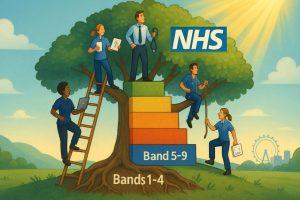The NHS is not only one of the UK’s largest employers but also a symbol of public service, care, and compassion. For over a million employees, understanding how their salaries are structured is crucial both for career progression and financial planning. With the 2025 update to the Agenda for Change pay bands, staff across the service are revisiting what their job titles are really worth.
As public expectations rise and costofliving challenges persist, the Agenda for Change remains a vital framework determining how fairly and competitively NHS workers are compensated in today’s healthcare economy.
What Is the Agenda for Change?

Agenda for Change (AfC) was introduced in 2004 to overhaul the fragmented NHS pay system. Before this reform, NHS staff were paid under a variety of different schemes, often leading to inconsistencies and pay inequalities across the UK.
AfC aimed to standardise pay by introducing a unified grading system that reflected:
- The complexity of job roles
- The level of responsibility
- Required skills, knowledge, and effort
This resulted in a clearer pathway for staff to understand how their pay aligns with their duties and to identify opportunities for progression.
Who Is Included in This Pay System?
AfC applies to a vast majority of NHS staff, including:
- Nurses and midwives
- Allied health professionals
- Administrative and clerical workers
- Support roles such as healthcare assistants and porters
Doctors, dentists, and senior managers are excluded, as they are governed by different pay frameworks.
Why Agenda for Change Does It Matter in 2025?
The Current NHS Landscape
In 2025, the NHS continues to operate under significant strain. With increased demand for healthcare services, staff burnout, and ongoing recruitment challenges, ensuring that pay structures are transparent, competitive, and fair is more important than ever.
The Agenda for Change not only sets salaries but also reinforces professional recognition, influencing retention rates and workforce morale. A well compensated workforce is more motivated, better retained, and more capable of delivering consistent care.
Economic Pressures and Public Expectations
Rising living costs, particularly in regions like London, amplify the importance of a fair wage. The public also demands more accountability from public institutions, and Agenda for Change is a key tool in ensuring NHS compensation systems reflect modern workforce needs.
How Are NHS Pay Bands Structured Under Agenda for Change?

A Clear Framework of Nine Pay Bands
Agenda for Change divides eligible roles into nine pay bands, each with a number of progression points. These bands define not only starting salaries but also the pay ceilings available within each role type.
For example:
- Band 2 may include support staff with basic training.
- Band 5 typically applies to newly qualified nurses.
- Band 8c or 9 could encompass senior leadership and directorlevel roles.
Each band reflects increasing responsibility, decisionmaking authority, and required qualifications.
Pay Points and Career Growth
Within each band are pay points, which allow employees to advance in salary over time. Progression is usually reviewed every two years and depends on performance evaluations, known as Pay Step Reviews. These reviews consider:
- Job performance
- Continued professional development
- Compliance with mandatory training
Employees no longer automatically move up; progression is earned through demonstrated competence and contribution.
How Much Can You Earn in Each NHS Band in 2025?
Updated NHS Pay Table for 2025 (Including London Weighting)
| Band | Entry Point | Mid Point | Top Point | Inner London Weighting |
| Band 1 | £22,762 | – | – | +£4,378 |
| Band 2 | £23,139 | £23,954 | – | +£4,378 |
| Band 3 | £23,915 | £25,147 | – | +£4,378 |
| Band 4 | £25,147 | £27,596 | – | +£4,378 |
| Band 5 | £28,407 | £30,639 | £34,581 | +£4,378 |
| Band 6 | £35,392 | £37,350 | £42,618 | +£4,378 |
| Band 7 | £43,742 | £46,054 | £50,056 | +£4,378 |
| Band 8a | £53,955 | – | £61,605 | +£4,378 |
| Band 8b | £63,751 | – | £73,664 | +£4,378 |
| Band 8c | £75,853 | – | £86,170 | +£4,378 |
| Band 8d | £88,349 | – | £101,974 | +£4,378 |
| Band 9 | £107,949 | – | £123,603 | +£4,378 |
Factors Influencing Your Salary Within a Band
Your placement on the pay scale depends on various elements:
- Length of NHS service
- Relevant qualifications or experience
- Results of Pay Step Reviews
- Location, with London weighting significantly boosting base salaries
Does Your NHS Job Title Really Match the Pay Band?
The Job Evaluation Scheme Explained
Each NHS role undergoes a formal job evaluation to determine its appropriate band. This system considers factors such as:
- Knowledge and skills required
- Degree of autonomy and decisionmaking
- Physical, emotional, and mental effort
- Communication demands and leadership responsibility
This process ensures that each role is placed in the correct band, promoting consistency and fairness across trusts.
Examples of Roles and Corresponding Bands
| Job Title | Band |
| Domestic Assistant | Band 1 |
| Healthcare Assistant | Band 2 |
| Senior Healthcare Assistant | Band 3 |
| Assistant Practitioner | Band 4 |
| Staff Nurse / Paramedic | Band 5 |
| Senior Nurse / AHP | Band 6 |
| Ward Manager / Clinical Specialist | Band 7 |
| Matron / Service Manager | Band 8a–8b |
| Director of Operations | Band 9 |
How Does London Weighting Affect NHS Pay?

The High Cost Area Supplement (HCAS) is provided to NHS staff in and around London to compensate for the city’s elevated living costs. This supplement is added to base salaries and varies by zone.
Breakdown of London Weighting in 2025
| Zone | Supplement |
| Inner London | 20% (min £4,378) |
| Outer London | 15% (min £3,800) |
| Fringe London | 5% (min £1,192) |
Londonbased NHS staff receive higher gross salaries than counterparts in other parts of the UK, helping ensure affordability and equity.
What Changes Did the NHS Pay Review Body Recommend for 2025?
The 2025 NHS Pay Review Body called for several important updates:
- A 5.5% increase to all pay points in response to inflation
- Faster progression within lower bands to address recruitment challenges
- Formal recognition and rebanding of digital health roles emerging in telehealth and AIdriven services
These changes reflect both economic realities and the NHS’s evolving workforce needs.
How Do You Progress Through the Agenda for Change Pay Bands?
Pay Step Reviews and Development
NHS staff must undergo Pay Step Reviews to move up within a band. This process evaluates:
- Achievement of agreed objectives
- Participation in training and professional development
- Managerial feedback and conduct
Opportunities for Career Growth
Staff can move between bands by taking on roles with increased responsibilities or qualifications. Common progression pathways include:
- Band 5 Nurse → Band 6 Clinical Specialist
- Band 6 Paramedic → Band 7 Team Leader
- Band 7 → Band 8a Management Role
Where Can You Find Reliable Information on Your NHS Salary?

Official NHS Sources
The most accurate and uptodate salary data can be found via:
- NHS Employers
- Your local NHS Trust’s HR department
- Union websites like UNISON or RCN
NHS Pay Calculators and Tools
Free online tools like NHS Pay Calculator allow staff to estimate their salary, factoring in deductions, pension contributions, and locationbased supplements.
How Do NHS Pensions and Benefits Complement the Agenda for Change Pay Structure?
A Look at the NHS Pension Scheme
One of the most valued aspects of working in the NHS is the NHS Pension Scheme, considered among the best in the UK public sector. It provides a defined benefit pension, meaning staff receive a guaranteed income upon retirement based on their career earnings and length of service.
There are two main pension arrangements:
- 1995/2008 Scheme: Based on final salary
- 2015 Scheme: Based on career average earnings (CARE)
The 2015 Scheme is the current default, offering benefits such as:
- An annual pension of 1/54th of your pensionable earnings for each year of membership
- Index-linked increases in line with inflation
- A lump sum option at retirement
Other NHS Staff Benefits
Beyond pay and pension, NHS employees benefit from:
- Generous annual leave (starting at 27 days, increasing with service)
- Sick pay entitlements exceeding statutory minimums
- Maternity, paternity, and adoption leave
- Access to NHS discounts on retail, travel, and leisure
- Opportunities for flexible working arrangements
These benefits often make up for modest salary figures, particularly in early career stages, and contribute to overall financial and personal wellbeing.
What Are the Career Development Opportunities Within the NHS Pay Bands?

Structured Learning and Growth
The NHS places a strong emphasis on continuous professional development (CPD), providing access to training, qualifications, and support to help staff grow within or across bands.
For example, a Band 5 nurse might enroll in specialist courses and leadership training to become eligible for Band 6 roles, such as a Senior Nurse or Clinical Educator.
Pathways to Higher Bands
There are clear routes for those aiming to move up the pay scale, including:
- Clinical ladder progression: Advancing through more specialised roles
- Education and research tracks: Moving into academic and teaching posts
- Management and leadership roles: Shifting into operational or strategic positions within the NHS Trust
Trusts often provide study leave, bursaries, and mentorship to support staff aiming for promotions or changes in career direction.
Career development is not just encouraged but essential for NHS workforce planning helping retain skilled professionals and reduce turnover.
Conclusion
The Agenda for Change pay system remains one of the most structured and transparent in the UK’s public sector. With ongoing revisions in 2025 including inflationlinked raises, adjustments for modern job roles, and efforts to support retention. it continues to reflect the NHS’s commitment to fairness and equity.
For NHS staff, understanding your pay band is about more than just your payslip. It’s a tool for planning your career, gauging your value, and securing the recognition you deserve.
FAQs About Agenda for Change Pay Bands
How often are NHS pay bands updated?
They are reviewed annually, usually announced in spring and implemented by April.
Do all NHS roles follow Agenda for Change?
No. Doctors, dentists, and some senior managers operate under different frameworks.
What is the starting salary for Band 5 in 2025?
£28,407 before London weighting and other benefits.
Can job applicants negotiate their NHS band?
Banding is based on role evaluation, not negotiation, but experience may affect your starting pay point within a band.
What does pay progression mean in the NHS?
It refers to moving through pay points within your assigned band, subject to reviews.
How does London weighting influence NHS salaries?
It adds between 5% and 20% to your base pay, depending on the zone.
Is Agenda for Change used across the UK?
Yes, but devolved nations may apply slight regional variations.









Leave feedback about this